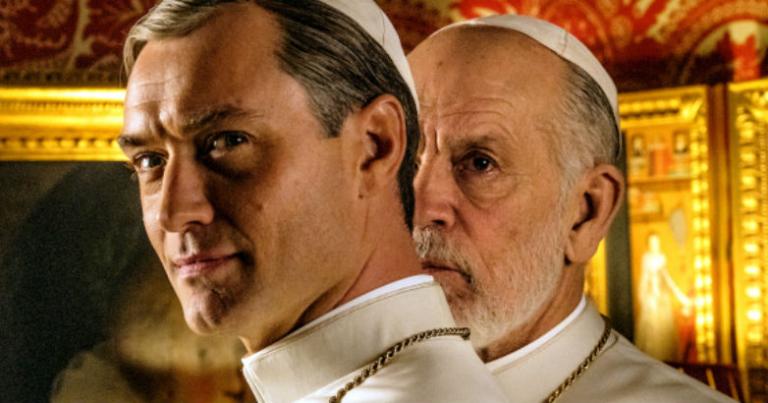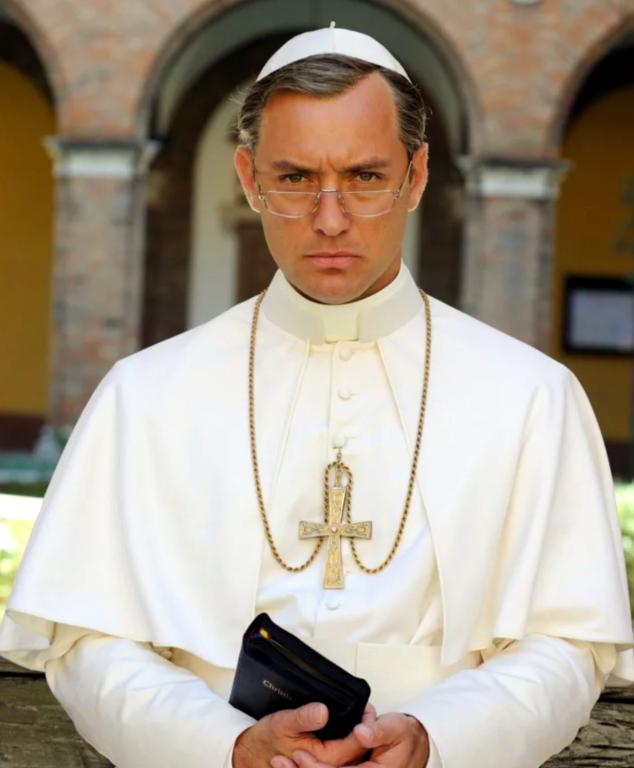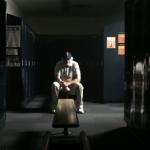
To my surprise, I enjoyed The Young Pope on HBO. Dare I hope that its successor, The New Pope, could be as good? The history of sequels argues otherwise, but we shall see … eventually.
To be clear, 2016’s The Young Pope — written and directed by Italian Paolo Sorrentino — was hardly a factually accurate depiction of the papacy (or, in all cases, of the Church). But as a work of imagination, it got a lot right about the mystery, majesty, complexity and power of the Church — and its future.
Jude Law starred as Pope Pius XIII, a brash American with possibly saintly powers who proceeded to wreak havoc in the Vatican hierarchy and elsewhere, in the name of restoring some of what the Church has lost to modernity (you can still watch it on HBO NOW and HBO GO, and HBO On Demand).
After seeing the first five episodes of The Young Pope, I said this (I go into detail about a lot of other things in the piece):
All this being said, The Young Pope is bizarrely entertaining, and it does ask interesting questions. There’s even a moment when the aggressively enigmatic pontiff declares an end to ecumenicism and fuzzy platitudes, and seeking the approval of the world, that might warm the hearts of some traditionalists.
He wants to slam shut the open windows of Vatican II and return to the Church its aura of mystery and wonder.
Sorrentino also seems to understand one of the paradoxes of the Church today — that younger people can wind up being more orthodox and tradition-minded than their Boomer elders. They’ve seen the wages of the misapplication and distortion of Vatican II, and a fair number of them are flocking back to the Tridentine Mass as a result.
…
The Young Pope frequently plays fast and loose with Catholic theology, and Pius XIII is a pontiff that could exist only in a fantasy (thank goodness for that). Nevertheless, I found the series intriguing, weird, sometimes clumsy, often beautiful and occasionally quite moving. In short, it’s been a lot like my experience of coming back to the Church itself.
I never felt like I was wasting my time (and that’s saying something).
If there’s a season two, I’ll check it out.
Well, season two, called The New Pope, is coming, perhaps some time in 2019. Although, it’s not being presented at the upcoming summer edition of the biannual TV Critics Association Press Tour, so that now seems unlikely. Wouldn’t be surprised if they run it in the new year, either beginning or ending around Easter. That’s often how these things go. We have no descriptions yet, but there has been casting news.
The Young Pope ended with a cliffhanger about the fate of Pius XIII, who collapsed during an address. Photos from The New Pope (see above and below) show Law returning in his role, but given the show’s fanciful take on reality, I wouldn’t make assumptions about how or why that happens.

We do know that there is a new pope, and he appears to be played by veteran actor John Malkovich, joined in the cast by Sharon Stone and rocker (and sometime actor) Marilyn Manson. Again, it would be wise to assume nothing about their roles.

Returning cast members include Cecile de France as Vatican marketing executive Sofia; Ludivine Sagnier as the wife of a Swiss Guard; and Silvio Orlando as the politically manipulative Cardinal Voiello. Sorrentino is co-writing the series, co-produced by HBO and Sky Italia, with Umberto Contarello and Stefano Bises; producers are Lorenzo Mieli and Mario Gianani.
Even if the rare faith- or Catholic-themed show starts well, it’s hard — whether because of ignorance, laziness, malice or outside pressures — for Hollywood to maintain it. Season one of The Exorcist on Fox was really good, but it fell apart in season two. Season one of Lucifer on Fox had redeeming elements, but it also fell apart for me in season two. But, Netflix’s Daredevil, despite changing showrunners and writers, maintained its Catholicity and quality through three seasons, so it can be done.
I can’t speak for Sorrentino’s personal spirituality, but it does seem he’s done his homework, so he doesn’t appear ignorant of what the Church is or what she teaches. He may spring off from that on a flight of fancy, but he starts from knowledge.
It’s better to let Sorrentino speak for himself, as he did while discussing The Young Pope with Helen Barrow of Australia’s SBS.com. Here’s an excerpt:
HB: Were you aiming to be critical of the Catholic Church?
PS: That was not my priority. My interest was in breaking the taboos in the portrayal of priests and nuns, in the representation of the clergy in general, because they are always painted as saints or scoundrels. I wanted to paint them for that they are – human beings, strange human beings who have to relate with God, this invisible entity, as well as having a normal life.
HB: They give up their normal lives so that makes them weird.
PS: It’s true, they don’t live normal lives, but we cinema people don’t either. They escape reality because they are scared of it, and they embrace the Church. We escape reality because we didn’t like it, and we embrace filmmaking.
HB: You have not included many topical issues like homosexuality, contraception and abortion (NOTE: Abortion is tackled in an episode. Click here for the video.)
PS: It’s best to avoid them because they can become outdated very soon. I treated paedophilia in one episode, though this Pope is very quick to change his mind from one day to the next.
HB: Were you attracted to the theatricality of the Catholic Church?
PS: Yes indeed. It’s very close to my idea of mise-en-scène (artistic design). The ritual, the theatrical aspect of the Catholic Church is something that I like very much.
HB: The character is a fascinating study of power.
PS: I’m fascinated by psychology. Often if there is a greed for power, what is underneath is a lack of self-confidence and identity problems, because otherwise you cannot explain this mania for controlling everything and for exerting your power over other human beings. It’s a psychological schizophrenic attitude that I think is very interesting to explore. If you have power, you are obliged to be very lonely and that’s another condition that I’m interested in exploring.
He also gave a hint of season two, saying:
HB: Why didn’t you include Opus Dei?
PS: Despite the fact that 10 hours seems a lot of time, the Catholic Church is such a vast issue that we had to leave it out. It will probably be in the second season.
Stay tuned.
In the meantime, here’s a behind-the-scenes peek of Malkovich filming …
Images: HBO
Don’t miss a thing: Subscribe to all that I write at Authory.com/KateOHare.
And, head over to my other home, as Social Media Manager at Family Theater Productions; and check out FTP’s Faith & Family Media Blog, and our YouTube Channel.














